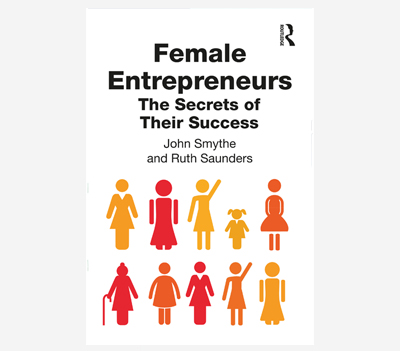
The secret success to female entrepreneurs
Authors John Smythe and Ruth Saunders announce the publication of their book ‘Female Entrepreneurs – The Secrets of their Success’, written to inspire and encourage female entrepreneurship.
The book is based on interviews with 52 female entrepreneurs of all ages and at all stages of business: from the renowned internet entrepreneur Martha Lane Fox to Sarah Turner, co-founder and CEO, Angel Academe, an award-winning angel investment network; Sian Sutherland, co-founder of Mama Mio, one of the first brands dedicated to pregnancy skincare and now co-founder of A Plastic Planet, where she is inspiring the world to turn off the plastic tap; Kate Andrews of Loco2; an online rail ticketing and routing service with an emphasis on low carbon travel and Lara Morgan, founder of Pacific Direct and investor in Scentered, KitBrix, Yogi Bare, dryrobe and Gate8-luggage.
The interviewees range from the youngest, actor and filmmaker Verity Drew Firth at 12 years old, to Jane Mosley, Granny Olive’s Kitchen, who started her small but vibrant baking business after retirement.
The objective of the book is to encourage women who have never considered becoming an entrepreneur, as well as women who have considered it but feel constrained by extrinsic and intrinsic barriers, to do so – a subject that is more relevant than ever given the number of new entrepreneurs that the Covid-19 crisis has created almost overnight.
Additionally, the book encourages society, Government and the corporate world, particularly investors, to recognise and embrace the huge value that female entrepreneurs bring to society and the economy.
John Smythe, co-author, said: “Time and again, we hear from talented women that they’ve been driven from their corporate careers and had to become entrepreneurs out of necessity. They are then hampered by the fact that 91% of venture capital money funds businesses founded solely by men. It’s time to get serious about creating and supporting a vibrant culture of female entrepreneurship in the UK and unleash this incredible resource for the good of women and society as a whole.”
Ruth Saunders, co-author, said: “Throughout history, crises have been pivotal in disrupting society. Covid-19 is no exception. New entrepreneurs and business models are springing up almost overnight, with people pivoting to solve problems created by the pandemic and prepare for life in the future. This is an incredible time for women who have dreamt of being an entrepreneur, but haven’t yet taken the leap, to take their first steps towards realising their goals.”

The book is based on interviews with 52 female entrepreneurs of all ages and at all stages of business: from the renowned internet entrepreneur Martha Lane Fox to Sarah Turner, co-founder and CEO, Angel Academe, an award-winning angel investment network; Sian Sutherland, co-founder of Mama Mio, one of the first brands dedicated to pregnancy skincare and now co-founder of A Plastic Planet, where she is inspiring the world to turn off the plastic tap; Kate Andrews of Loco2; an online rail ticketing and routing service with an emphasis on low carbon travel and Lara Morgan, founder of Pacific Direct and investor in Scentered, KitBrix, Yogi Bare, dryrobe and Gate8-luggage.
The interviewees range from the youngest, actor and filmmaker Verity Drew Firth at 12 years old, to Jane Mosley, Granny Olive’s Kitchen, who started her small but vibrant baking business after retirement.
The objective of the book is to encourage women who have never considered becoming an entrepreneur, as well as women who have considered it but feel constrained by extrinsic and intrinsic barriers, to do so – a subject that is more relevant than ever given the number of new entrepreneurs that the Covid-19 crisis has created almost overnight.
The issue - the massive chasm in funding for female entrepreneurs
Female entrepreneurs in the UK are starting up and running successful businesses in increasing numbers. Yet, female entrepreneurship is still a long way behind the level of its male counterparts, with women at almost every stage less likely to become entrepreneurs.
Today, women make up only one third of all UK entrepreneurs, less than 20% of leaders of small to medium-sized enterprises (SMEs), and less than ten percent of leaders of entrepreneurial startups in the science, engineering and technology sectors.
The primary cause of this is the lack of funding for female entrepreneurs. Shockingly, just one percent of venture capital goes to businesses founded by all-female teams, nine percent to businesses with at least one female founder, and 91% to businesses founded by all-male teams. Instead, women are forced to self-fund their businesses with money from friends and family, incur credit card debt, or crowd fund.
This is in part due to the lack of senior females on U.K. investment teams (13% of the total), with almost half of investment teams (48%) having no women at all. The result is male investors investing in ideas that they understand, and in people who are more in their own likeness – namely other men.
Yet a number of US and UK reports indicate that, once started, female-led startups are more profitable than their male-led counterparts.
Concerningly, female entrepreneurship in the U.K. also lags behind other countries, with only six percent of U.K. women running their own businesses, compared to 15% of women in Canada, almost 11% of women in the US, and over 9% of women in Australia and the Netherlands.
Key findings from 52 successful female entrepreneurs
The interviewees demonstrate that you don’t have to be superwoman to start an enterprise. Nor do you need a brilliant idea at the outset. You just need the ambition and resilience to make it happen. Core findings to inspire budding entrepreneurs includes:
- You can start your business at any age or life stage. Entrepreneurs who started their businesses before the age of ten and on into their sixties are featured.
- The reasons for starting a business are many and varied. Some turned a passion or hobby into a business. Others left the corporate world to combine a career with a family or create a more collaborative, female-friendly workplace. Some solved a personal challenge and realised others could benefit from it. Others needed to make money to survive.
- Not knowing your proposition isn’t a hindrance to success. The main predictor of entrepreneurial success is the desire and determination to be an entrepreneur, even if at first you don’t have a firm idea about your proposition.
- To be a great leader, don’t expect to be good at everything. Instead, play to your strengths and surround yourself with people who can cover your weaknesses.
- To be successful, embrace failure as an essential part of the journey and an inevitable driver of growth. There were many stories of failure resulting in the next big growth spurt.
- Leverage the power of working mums. Many female entrepreneurs are using part- or full-time associates to minimise the risk and overhead of employing people, as well as tapping into a large and underutilised workforce.
- Enjoy the journey. At times, building a business can be tough, challenging and all-consuming. Consequently, it’s important to start a business in something that you are passionate about so that you can ‘enjoy the journey’. In the entrepreneurs’ view: ‘If you’re doing it solely for money, then it’s probably not going to work’.
Analysing the interviewees’ stories also identified some insights for broader society.

